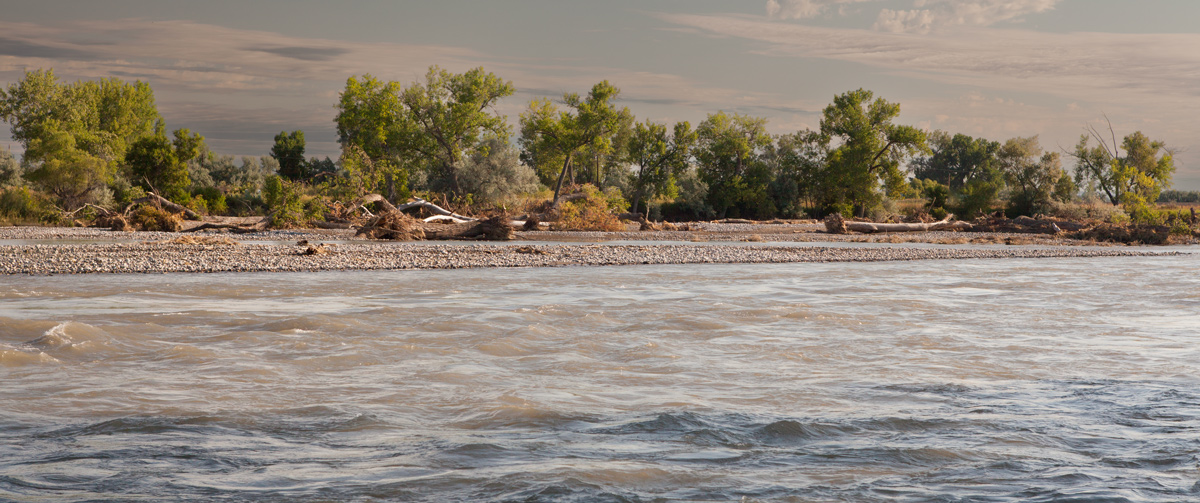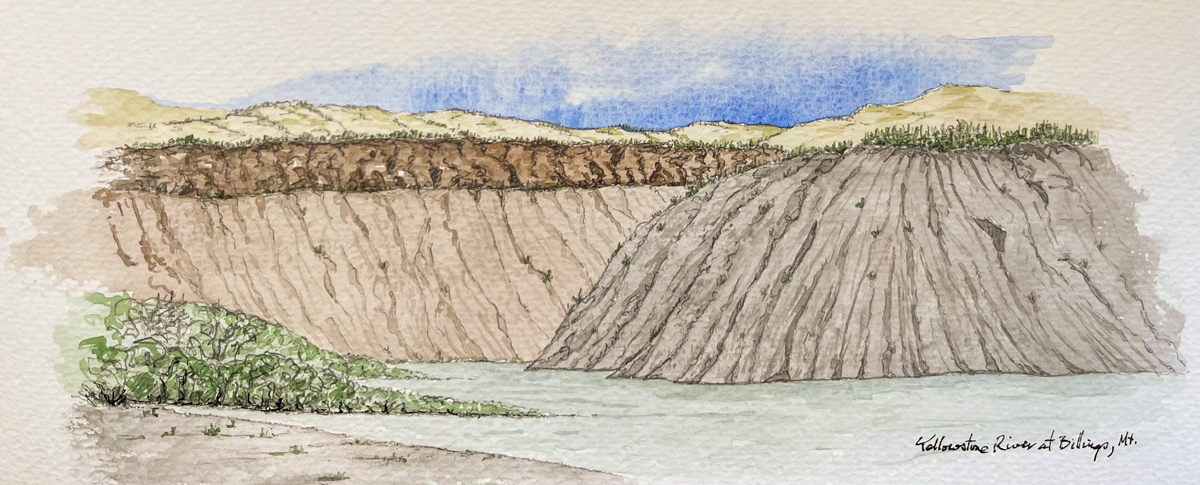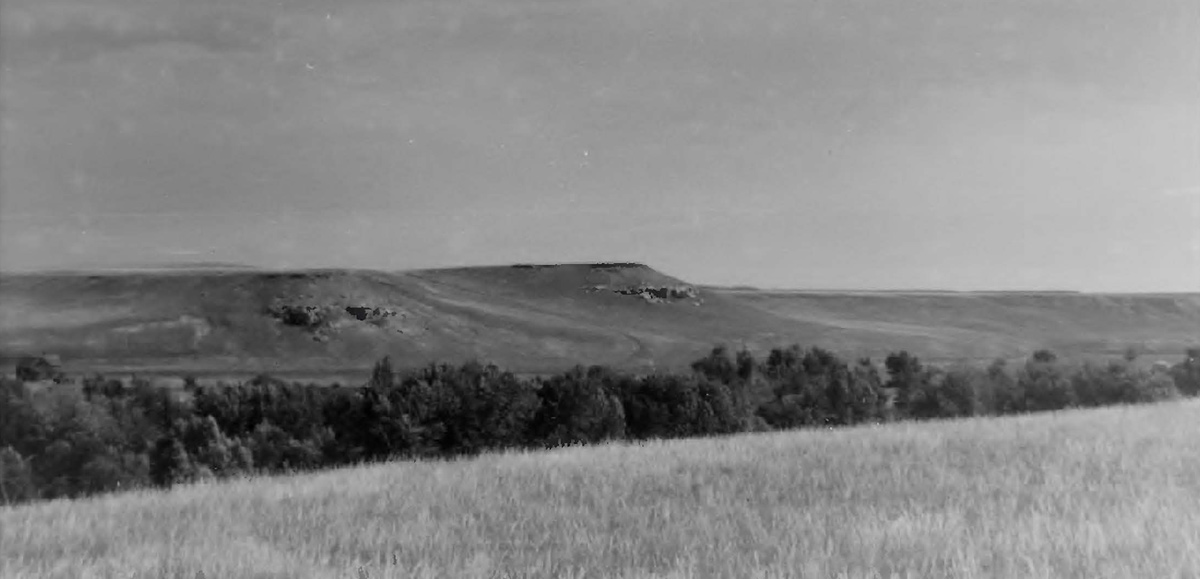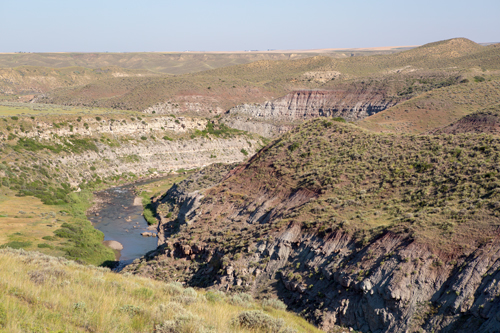On the Yellowstone River, the new dugouts are launched. Above present Billings, they meet with Sgt. Pryor and help him take the horses across the river. The boats continue down a rapid river making 70 miles for the day.
After crossing the Yellowstone, Pryor, three others, and all the horses start out on an Indian road leading to the Knife River Villages.
At Camp Disappointment near present Cutbank, Montana, Lewis is unable to take the desired celestial observations and has a meal of pigeon, cous root, and buffalo grease.
At the Great Falls of the Missouri, Sgts. Ordway and Gass direct the portage of the dugout canoes. One canoe is taken to the Lower Portage Camp.[1]For more on the captains’ strategy and various groups after leaving Travelers’ Rest, see Dividing Forces at Travelers’ Rest.
Clark Confused
by Yellowstone Public Radio[2]Originally aired weekdays by Yellowstone Public Radio during the Bicentennial observance of 2003-2006. Narrated by Hal Hansen. Scripts by Whit Hansen and Ed Jacobson. Produced by Leni Holliman. © … Continue reading
Clark Steers Down the Yellowstone
Yellowstone River near Laurel
© 27 July 2017 by Kristopher K. Townsend. Permission to use granted under the Creative Commons Attribution-Share Alike 4.0 International license.
Leaving Canoe Camp
had all our baggage put on board of the two Small Canoes which when lashed together . . . . the Small Canoes took in a good deel of water which obliged us to land a little above the enterance of this river which the [blank] has called Clarks fork to dry our articles and bail the Canoes. I also had Buffalow Skin tacked on So as to prevent the waters flacking in between the Two canoes.
—William Clark
Large Indian Village
[This large lodge] is Situated in the Center of a butifull Island thinly Covered with Cotton wood [Cottonwood] under which the earth which is rich is Covered with wild rye and a Species of grass resembling the bluegrass, and a mixture of Sweet grass which the Indian plat and ware around their necks for its cent which is of a Strong sent like that of the Vinella
—William Clark
Good Hunting
I landed on the Lard Side walked out into the bottom and Killd the fatest Buck I every Saw, Shields killed a deer and my man York killed a Buffalow Bull, as he informed me for his tongue and marrow bones . . . . for me to mention or give an estimate of the differant Spcies of wild animals on this river particularly Buffalow, Elk Antelopes [pronghorns] & Wolves would be increditable. I shall therefore be silent on the Subject further.
—William Clark
Reaching “Pryers river”
we made 70 ms. to day Current rapid and much divided by islands. Campd a little below Pryers river
—William Clark
Weather Dairy (Clark)
State of the weather at Sun rise Wind at Sun rise State of the weather at 4 P. M Wind at 4 P M. fair S W rain S W. Violent wind last night. river falling a little Since the last rise it had fallen 13 inches. river falling a little it is 6 feet lower than the highest appearance of it’s rise. Rained from 3 to 4 P M but Slightly. the wind violent from the S. W. (Sgt. Pryor crossd and Set out for the Mandans.
—William Clark[3]To assist the reader of this web page, the date column is omitted and some abbreviations have been spelled out.
Pryor’s Mission Begins
Yellowstone River near Billings, Montana
by Wayne Wilson
Watercolor © 2019 Wayne Wilson. Used by permission.
Difficult Horses
Sergt. Pryor informed me that it would be impossible for the two men [Shannon and Windsor] with him to drive on the horses after him without tireing all the good ones . . . . he at length found that the only practiacable method would be for one of them to proceed on and when ever they Saw a gang of Buffalow to Scear them off before the horses got up
—William Clark
Fording the Yellowstone
I had the horses drove across the river and Set Sergt. Pryor and his party across.
—William Clark
Leaving Clark
H. Hall who cannot Swim expressed a Willness to proceed on with Sergt. Pryor by land, and as another man was necessary to assist in driveing on the horses, but observed he was necked, I gave him one of my two remaining Shirts a par of Leather Legins and 3 pr. of mockersons which equipt him Completely and Sent him on with the party by land to the Mandans.
—William Clark
Lewis Obscured by Clouds
Observations Obscured by Clouds
At 8 A. M. the sun made it’s appearance for a few minutes and I took it’s altitude but it shortly after clouded up again and continued to rain the ballance of the day I was therefore unable to complete the observations I wished to take at this place.
—Meriwether Lewis
Pigeon, Cous, and Buffalo Grease Mush
we have still a little bread of cows [Cous] remaining of which we made a kettle of mush which together with a few pigeons that we were fortunate enough to kill served us with food for this day.
—Meriwether Lewis
Disappointing Weather
I determined to remain another day in the hope of it’s being fair . . . . the air has become extreemly cold which in addition to the wind and rain renders our situation extreemly unpleasant.
—Meriwether Lewis
Weather Dairy (Lewis)
State of the weather at rise
Wind at rise
State of the weather at 4 P. M. Wind at 4 P. M. cloudy after rain, thunder, & lightning N W cloudy after thunder and lightning N W. a violent gust of thunder Lightning last evening at 6 P. M. rain and wind all night untill this evening with some intervales.
—Meriwether Lewis
Gass and Ordway Make Progress
the party went back for two more canoes. About three o’clock, one of the waggons with a canoe arrived; and the party with it; having let the horses feed a while, and taken dinner, they proceeded on to Portage river.
—Patrick Gass
Experience the Lewis and Clark Trail
The Lewis and Clark Trail Experience—our sister site at lewisandclark.travel—connects the world to people and places on the Lewis and Clark Trail.
Plan a trip related to July 24, 1806:
- Marias Museum of History and Art (Lewis)
- Pompeys Pillar (Clark)
- Billings to Yellowstone Confluence Driving Tour (Clark)
- Knife River Indian Villages (Pryor)
- Lewis and Clark National Historic Trail Interpretive Center (Gass and Ordway)

Camp Disappointment is a High Potential Historic Site along the Lewis and Clark National Historic Trail managed by the U.S. National Park Service. The site is on private property within the The Blackfeet Indian Reservation.
Clark’s Canoe Camp on the Yellowstone is a High Potential Historic Site along the Lewis and Clark National Historic Trail managed by the U.S. National Park Service. The site is on private property.
The Great Falls Portage is a High Potential Historic Site along the Lewis and Clark National Historic Trail managed by the U.S. National Park Service. It includes Sulphur Springs (open to the public) and Lower Portage camp site (private land), and the Upper Portage Camp Overlook.
Notes
| ↑1 | For more on the captains’ strategy and various groups after leaving Travelers’ Rest, see Dividing Forces at Travelers’ Rest. |
|---|---|
| ↑2 | Originally aired weekdays by Yellowstone Public Radio during the Bicentennial observance of 2003-2006. Narrated by Hal Hansen. Scripts by Whit Hansen and Ed Jacobson. Produced by Leni Holliman. © 2003 by Yellowstone Public Radio. |
| ↑3 | To assist the reader of this web page, the date column is omitted and some abbreviations have been spelled out. |






